The manufacturing of Greta Thunberg (part 1) - Political economy of non-profit industrial complex
The Manufacturing of Greta Thunberg - for Consent: The Political Economy of the Non-Profit Industrial Complex [ACT I]
This is ACT I of the six-part series: The Manufacturing of Greta Thunberg – for Consent: The Political Economy of the Non-Profit Industrial Complex
“How is it possible for you to be so easily tricked by something so simple as a story, because you are tricked? Well, it all comes down to one core thing and that is emotional investment. The more emotionally invested you are in anything in your life, the less critical and the less objectively observant you become.” — David JP Phillips, We Don’t Have Time board of directors, “The Magical Science of Storytelling”
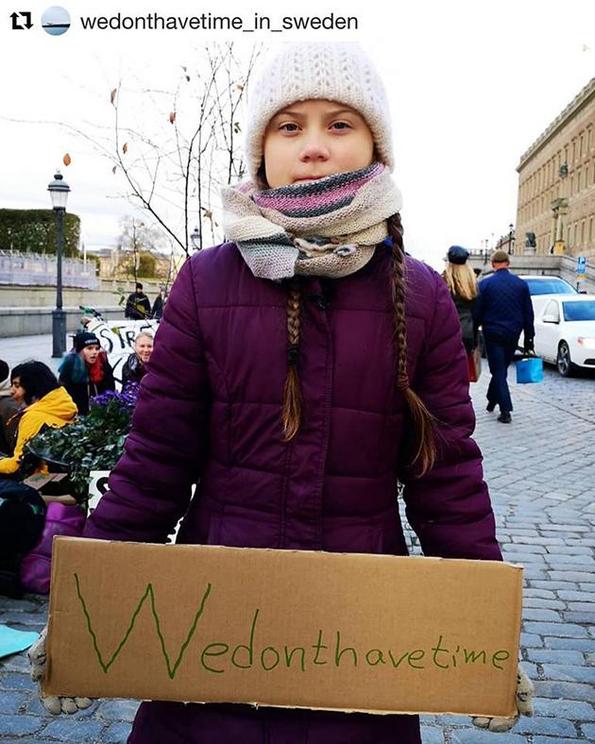 Greta Thunberg, We Don’t Have Time, Facebook, October 26, 2018
Greta Thunberg, We Don’t Have Time, Facebook, October 26, 2018
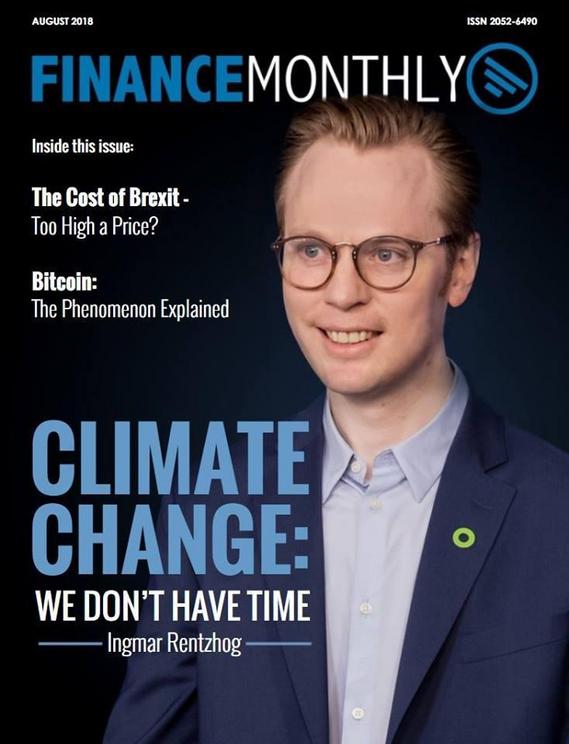 August 2018, Finance Monthly, co-founder of We Don’t Have Time, Ingmar Rentzhog
August 2018, Finance Monthly, co-founder of We Don’t Have Time, Ingmar Rentzhog
We Don’t Have Time
As this term is quickly becoming the quote du jour as a collective mantra to address the ongoing environmental disaster that can best be described as a nod to the obvious, it’s true that we don’t have time. We don’t have time to stop imperialist wars – wars being the greatest contributor to climate change and environmental degradation by far – but we must do so. Of course this is an impossible feat under the crushing weight of the capitalist system, a US war economy, and the push for a fourth industrial revolution founded on renewable energy. Yet, inconvenience has nothing to do with necessity in regards to addressing a particular situation. What is never discussed in regard to the so-called “clean energy revolution” is that its existence is wholly dependent on “green” imperialism – the latter term being synonymous with blood.
But that’s not what this series is about.
This series is about new financial markets in a world where global economic growth is experiencing stagnation. The threat and subsequent response is not so much about climate change as it is about the collapse of the capitalist economic system. This series is about the climate wealth opportunity of unprecedented growth, profits and the measures our elite classes will take in order to achieve it – including the exploitation of the youth.
What is We Don’t Have Time?
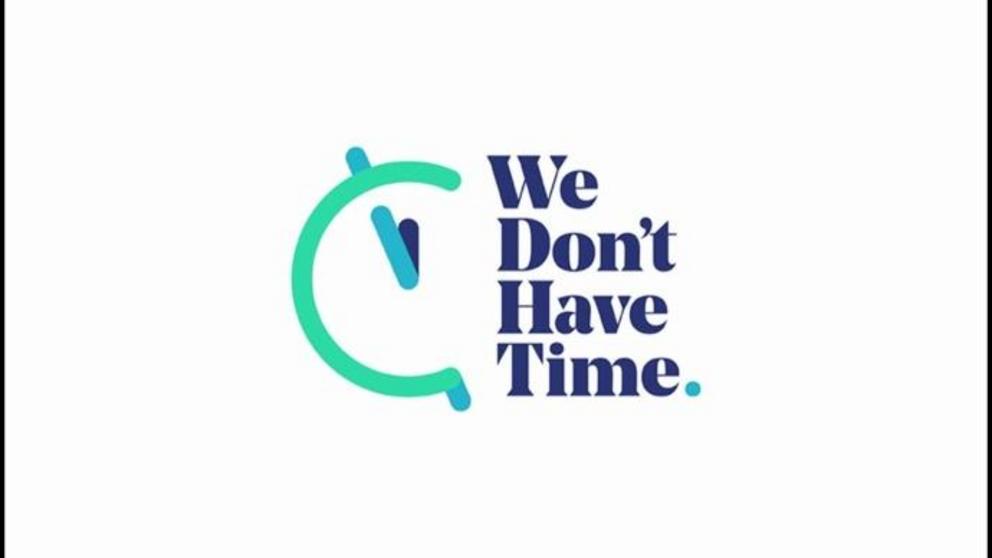
“Our goal is to become among the biggest players on the internet.” — Ingmar Rentzhog, We Don’t Have Time, December 22, 2017, Nordic Business Insider
On August 20, 2018 a tweet featuring a photo of “a Swedish girl” sitting on a sidewalk was released by the tech company, We Don’t Have Time, founded by its CEO Ingmar Rentzhog:
“One 15 year old girl in front of the Swedish parliament is striking from School until Election Day in 3 weeks[.] Imagine how lonely she must feel in this picture. People where [sic] just walking by. Continuing with the business as usual thing. But the truth is. We can’t and she knows it!”
Rentzhog’s tweet, via the We Don’t Have Time twitter account, would be the very first exposure of Thunberg’s now famous school strike.
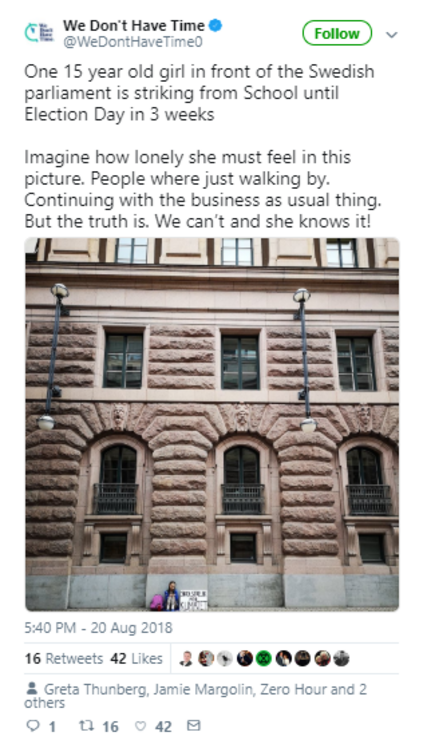 Above: We Don’t Have Time tweet, August 20, 2018
Above: We Don’t Have Time tweet, August 20, 2018
Tagged in Rentzhog’s “lonely girl” tweet were five twitter accounts: Greta Thunberg, Zero Hour (youth movement), Jamie Margolin (the teenage founder of Zero Hour), Al Gore’s Climate Reality Project, and the People’s Climate Strike twitter account (in the identical font and aesthetics as 350.org). [These groups will be touched upon briefly later in this series.]
Rentzhog is the founder of Laika (a prominent Swedish communications consultancy firm providing services to the financial industry, recently acquired by FundByMe). He was appointed as chair of the think tank Global Utmaning (Global Challenge in English) on May 24, 2018, and serves on the board of FundedByMe. Rentzhog is a member of Al Gore’s Climate Reality Organization Leaders, where he is part of the European Climate Policy Task Force. He received his training in March 2017 by former US Vice President Al Gore in Denver, USA, and again in June 2018, in Berlin.
Founded in 2006, Al Gore’s Climate Reality Project is a partner of We Don’t Have Time.
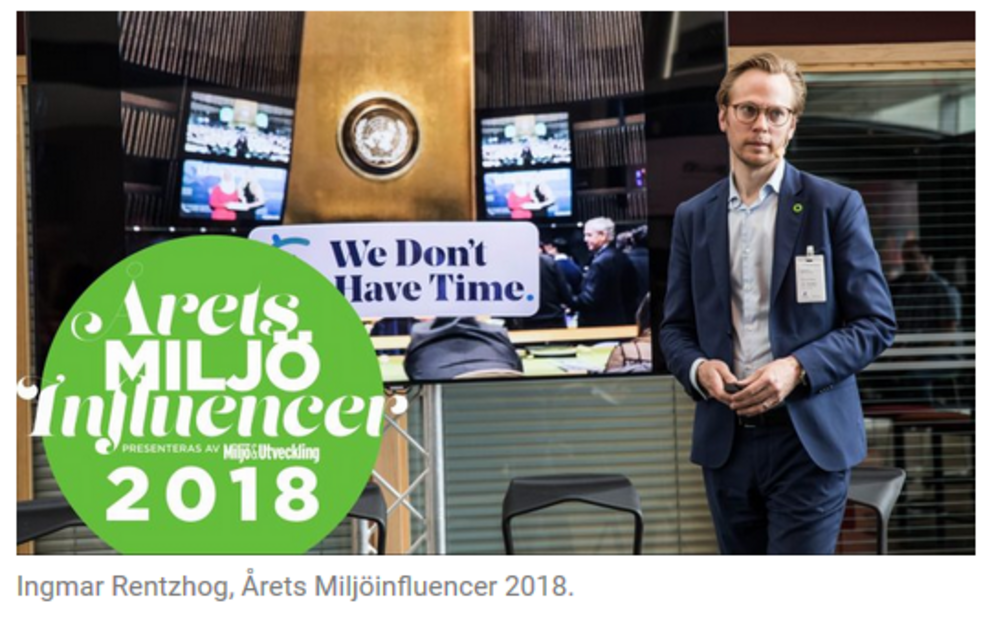
The We Don’t Have Time Foundation cites two special youth advisors and trustees: Greta Thunberg and Jamie Margolin. [Source]
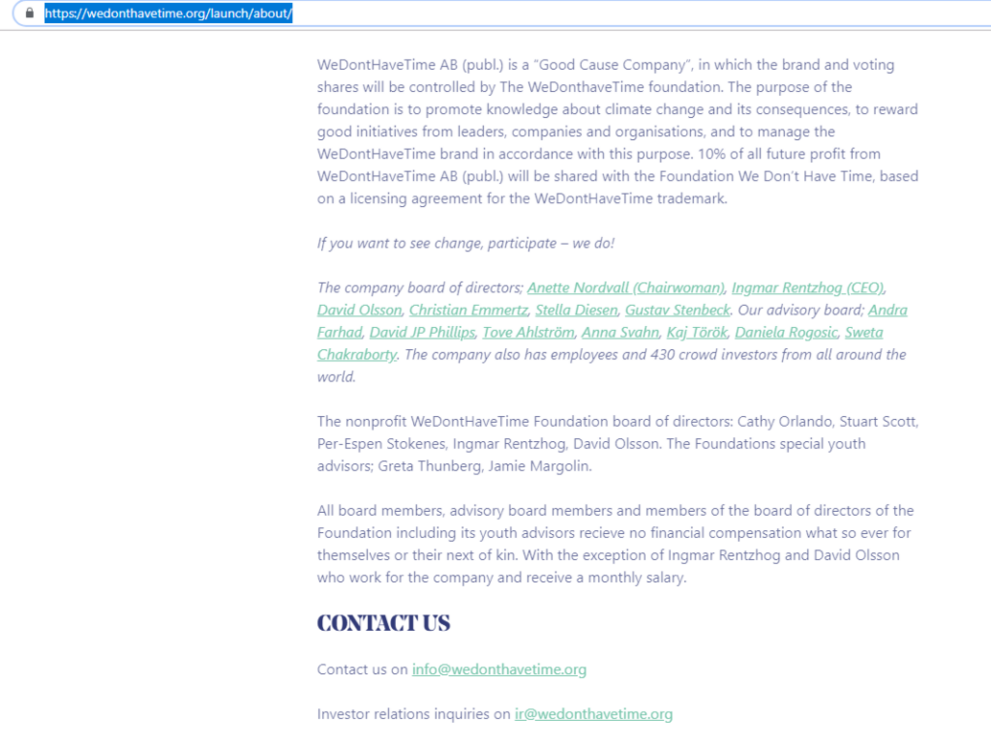
Mårten Thorslund, chief marketing and sustainability officer of We Don’t Have Time took many of the very first photos of Thunberg following the launch of her school strike on August 20, 2018. In the following instance, photos taken by Thorslund accompany the article written by David Olsson, chief operating officer of We Don’t Have Time, This 15-year-old Girl Breaks Swedish Law for the Climate, published August 23, 2018:
“Greta became a climate champion and tried to influence those closest to her. Her father now writes articles and gives lectures on the climate crisis, whereas her mother, a famous Swedish opera singer, has stopped flying. All thanks to Greta.
And clearly, she has stepped up her game, influencing the national conversation on the climate crisis—two weeks before the election. We Don’t Have Time reported on Greta’s strike on its first day and in less than 24 hours our Facebook posts and tweets received over twenty thousand likes, shares and comments. It didn’t take long for national media to catch on. As of the first week of the strike, at least six major daily newspapers, as well as Swedish and Danish national TV, [1] have interviewed Greta. Two Swedish party leaders have stopped by to talk to her as well.” [Emphasis added]
The article continues:
“Is there something big going on here? This one kid immediately got twenty supporters who now sit next to her. This one kid created numerous news stories in national newspapers and on TV. This one kid has received thousands of messages of love and support on social media…. Movements by young people, such as Jaime Margolin’s #ThisIsZeroHour that #WeDontHaveTime interviewed earlier, speaks with a much needed urgency that grown-ups should pay attention to…” [Emphasis in original]
Yes – there was, and still is, something going on.
It’s called marketing and branding.
“Yesterday I sat completely by myself, today there is one other here too. There are none [that] I know.” — Greta Thunberg, August 21, 2018, Nyheter newspaper, Sweden [Translation via Google]
The “one kid immediately got twenty supporters” – from a Swedish network for sustainable business. What is going on – is the launch of a global campaign to usher in a required consensus for the Paris Agreement, the New Green Deal and all climate related policies and legislation written by the power elite – for the power elite. This is necessary in order to unlock the trillions of dollars in funding by way of massive public demand.
These agreements and policies include carbon capture storage (CCS), enhanced oil recovery (EOR), bio-energy with carbon capture and storage (BECCS), rapid total decarbonization, payments for ecosystem services (referred to as “natural capital”), nuclear energy and fission, and a host of other “solutions” that are hostile to an already devastated planet. What is going on – is a rebooting of a stagnant capitalist economy, that needs new markets – new growth – in order to save itself. What is being created is a mechanism to unlock approximately 90 trillion dollars for new investments and infrastructure. What is going on is the creation of, and investment in, perhaps the biggest behavioural change experiment yet attempted, global in scale. And what are the deciding factors in what behaviours global society should adhere to? And more importantly, who decides? This is a rhetorical question as we know full well the answer: the same Western white male saviours and the capitalist economic system they have implemented globally that has been the cause of our planetary ecological nightmare. This crisis continues unabated as they appoint themselves (yet again) as the saviours for all humanity – a recurring problem for centuries.
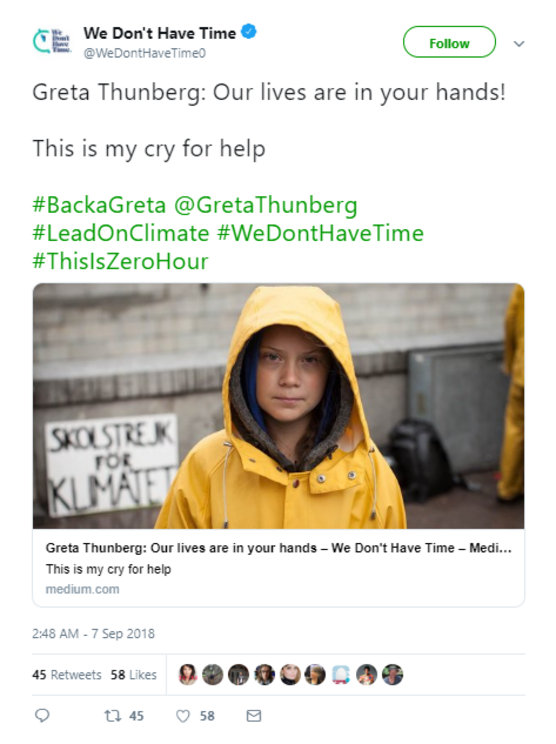
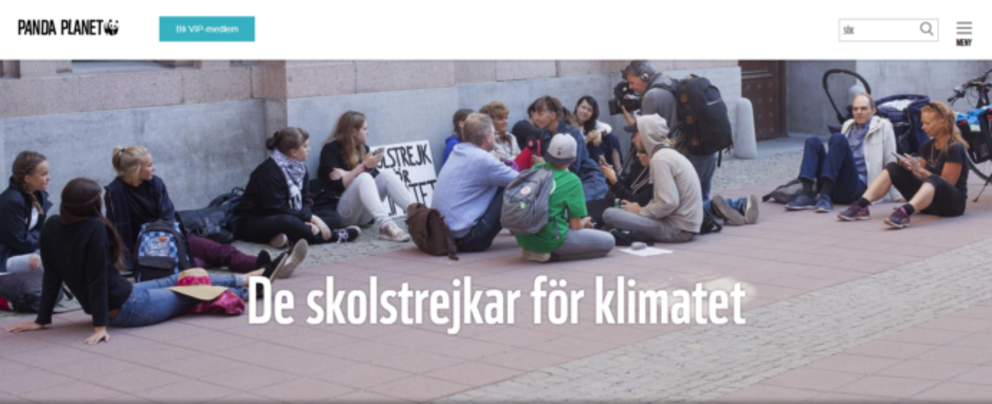 Source: WWF
Source: WWF
+++
“Our goal is to become at least 100 million users. It is an eighth of all who have climbed on social media. Only last month we managed to reach 18 million social media accounts according to a media survey that Meltwater news made for us. At Facebook, we are currently seven times the number of followers among the world’s all climate organizations. We are growing with 10,000 new global followers per day on Facebook.” — Ingmar Rentzhog interview with Miljö & Utveckling, October 15, 2018
We Don’t Have Time identifies itself as a movement and tech startup that is currently developing “the world’s largest social network for climate action”. The “movement” component was launched on April 22, 2018. The web platform is still in the progress of being built, but is to launch on April 22, 2019 (coinciding with Earth Day). “Through our platform, millions of members will unite to put pressure on leaders, politicians and corporations to act for the climate.” The start-up’s goal to rapidly achieve 100 million users has thus far attracted 435 investors (74.52% of the company’s shares) via the web platform FundedByMe.
The startup intends to offer partnerships, digital advertising and services related to climate change, sustainability and the growing green, circular economy to “a large audience of engaged consumers and ambassadors.”
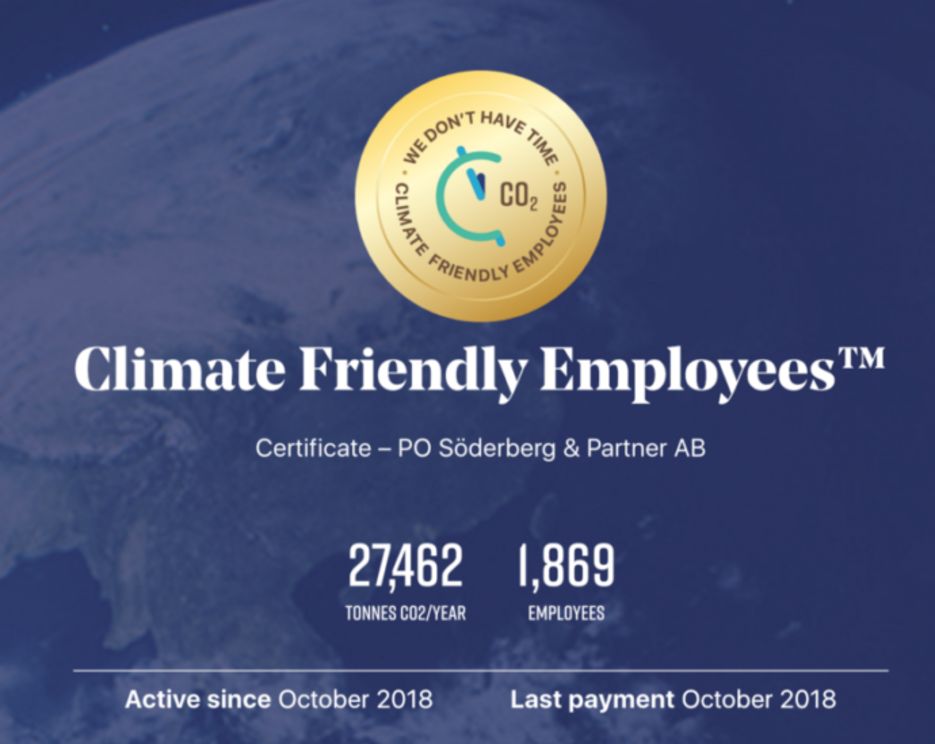
We Don’t Have Time is mainly active in three markets: social media, digital advertising and carbon offsets. [“In the US alone estimated market for carbon offsetting amount to over 82 billion USD of which voluntary carbon offset represents 191 million USD. The market is expected to increase in the future, in 2019 estimated 15% of all greenhouse gas emissions to be associated with any kind of cost for offsetting.”] As the company is a niche organization, social networks are able to provide services tailored to platform users. The startup has identified such an opportunity by offering its users the ability to purchase carbon offsets through the platform’s own certification. This option applies to both the individual user of the platform, as well as whole organizations/companies on the platform.
One incentive of many identified in the start-up investment section is that users will be encouraged to “communicate jointly and powerfully with influential actors.” Such influencers are Greta Thunberg and Jamie Margolin who both have lucrative futures in the branding of “sustainable” industries and products, if they wish to pursue this path in utilizing their present celebrity for personal gain (a hallmark of the “grassroots” NGO movement). [Further reading: The Increasing Vogue for Capitalist-Friendly Climate Discourse]
The tech company is banking on creating a massive member base of “conscious users” that will enable “profitable commercial collaborations, for example, advertising”:
“Decision makers – politicians, companies, organizations, states – get a climate rating based on their ability to live up to the users’ initiative. Knowledge and opinion gather in one place and users put pressure on decision makers to drive a faster change.”
“The main sources of revenue come from commercial players who have received high climate rating and confidence in the We Don’t Have Times member base.[2] … The revenue model will resemble the social platform of TripAdvisor.com’s business model, which with its 390 million users annually generates over $ 1 billion in good profitability…We will work with strategic partners such as Climate Reality leaders, climate organizations, bloggers, influencers and leading experts in the field.”
Video: We Don’t Have Time promotional video, published April 6, 2018 [Running time: 1m:38s]
A “state of conscious and permanent visibility assures the automatic functioning of power.” — Michel Foucault’s Discipline and Punish
Comparable to other social media endeavors where “likes”, “followers”, and unfathomable amounts of metadata determine financial success, the fact that the business is virtual enables high profit margins. The return on investment, best described as mainstream acquiescence and desirability by way of exposure, will be obtained through future dividends. In anticipation of this projected success, the tech company plans to take its business to the stock exchange in the near future. (Think Facebook and Instagram.) The most critical component to the success of this startup (like its predecessors) is achieving a massive member base. Therefore, according to the company it “will work actively with both enlisting influencers and creating content for various campaigns linked to the hashtag #WeDontHaveTime.”
[Download: Prospectus WE DON’T HAVE TIME PDF]
On April 18, 2018 the crowdfunding platform FundedByMe (utilized by We Don’t Have Time to enlist investors) acquired Ingmar Rentzhog’s Laika Consulting. Excerpts from the press release are as follows:
“FundedByMe today announced that they acquire 100% of the shares in the established financial company Laika Consulting AB, a leading communications agency in financial communications. As a result, the company doubles its investment network to close to 250,000 members, making it the largest in the Nordic region. The acquisition is a strategic step to further strengthen FundedByMe’s range of financial services…
[Ingmar Rentzhog] will continue to work on strategic client projects for FundedByMe and Laika Consulting in part-time. Moreover he takes a role in the company’s board. The majority of his time he will focus on climate change through the newly established company, “We Don’t Have Time”, as a CEO and founder.” [Emphasis added] [Source] [3]
We Don’t Have Time Software App: The Latest Wave of Western & Corporate Ideology at Your Fingertips
In October 2016, Netflix aired the third season of Black Mirror, “a Twilight Zone–esque anthology TV series about technological anxieties and possible futures.” The first episode “Nosedive” posits a shallow and hypocritical populace in which “social platforms, self-curation and validation-seeking” have become the underpinning of a future society. [Black Mirror’s third season opens with a vicious take on social media]. The disturbing episode shares parallels to the concept behind We Don’t Have Time. The difference being instead of rating people exclusively, we will be rating brands, products, corporations and everything else climate related.
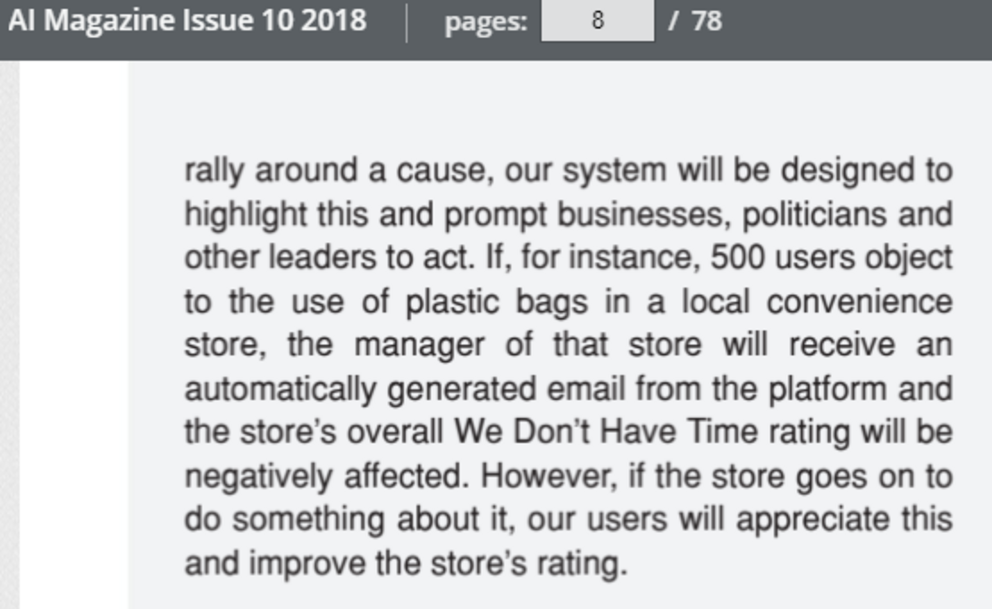 Acquisition International Magazine Issue 10, 2018
Acquisition International Magazine Issue 10, 2018
The not unintended results will be tenfold. The corporations with the best advertising executives and largest budgets will be the winners. Greenwashing will become an unprecedented method of advertising as will the art of “storytelling” (no one ever said a story has to be true). Small or local businesses with little financial means will more than often be the losers. Especially hit, will be migrant entrepreneurs whose cultures differ from ours in the West – where “Western democracy” is the only democracy that is valid.
Adding to the conversation as to who is ultimately benefiting from this endeavor from a cultural, social, geographical and ethnic perspective is the fact that “subconscious biases about race or gender, is a proven problem on many crowdsourced platforms.” [Source] Ultimately, this means that in order to acquire the needed support as a multimedia platform, the self-interest of the Western world must be at the fore with no concern for the Global South – other than what we can continue to steal from her. The inconvenient truth is that all roads lead to the same collective (if even subconscious) goal: the preservation of whiteness.
Rentzhog assures his audience that “our core, though, will remain, namely to empower our users to put pressure on world leaders so that they move faster towards an emission-free world and environmentally sustainable solutions and policies.” [Acquisition International Magazine Issue 10, 2018]
An “emission-free world” sounds enticing – yet there are no plans whatsoever to retract our growth economies. “Environmentally sustainable solutions” … according to who? According to a tribal elder who upholds the principles of “the seventh generation” (the Indigenous belief that humans must properly provide for its descendants by ensuring that our actions in the present allow the Earthly survival of seven succeeding generations – not to be confused with Unilever’s Seventh Generation acquisition) – or according to the World Bank? (We all know the answer to this rhetorical question.)
Another inconvenient truth, regarding the above premise, is that there is growing pressure on governments to increase Federal research and development funding to develop and deploy “deep decarbonisation” technologies as one of the primary “solutions” to climate change. This was proposed at the Paris Climate Accord with Bill Gates’ “Mission Innovation” initiative which committed to doubling government investment in energy technology.
“We want it to cost more, in terms of revenue, public support and reputation, to not work on lowering emissions and improve environmental sustainability, whereas those that lead the way should be recognized for this. Our vision is to create a race towards environmental sustainability and CO2 neutrality, making it the core priority for businesses, politicians and organizations worldwide.” — Acquisition International Magazine Issue 10, 2018
Here again, we must look closely at language and framing. Who are “those that lead the way”? Are they referring to Western citizens who can fit all their belongings in a duffle bag? [Here it must be said that the environmental heroes in the West are NOT the Richard Bransons or Leonardo DiCaprios of the world. The real heroes for the environment, due to their almost non-existent environmental footprint, are the homeless – despite the scorn they receive from society as a whole.] Are they referring to the African Maasai who to this day, literally leave no trace? Or are “those that lead the way” Unilever and Ikea (represented on the We Don’t Have time board). This is another rhetorical question we all know the answer to. Notice the mention of CO2 “neutrality” rather than a drastic reduction of CO2 emissions. Convenient language when one of the main pillars of the business model is the sale of carbon offsets – rationalizing a continuance of the same carbon based lifestyle by constructing a faux fantasy one, that anyone with monetary wealth, can buy into.
As online reviews and ratings systems have become a Western staple of determining the worthiness of a person, group or corporation, the internet presently is a primary source of determining the quality of an entity. One example of this type of system is the online site Trip Advisor, which utilizes user feedback as a measuring stick of a hotel, airline, car rental, etc. As the Trip Advisor rating system is the revenue model We Don’t Have Time seeks to emulate, we will explore this particular rating system.
Whereas a reputable and established website such as Trip Advisor is based on an actual experience – We Don’t Have Time evaluations are more geared toward promises into the future regarding a green technology revolution and/or the effectiveness of advertising in making people believe the veracity of these promises. By utilizing fake accounts (think Twitter and Facebook), strategically orchestrated campaigns will effectively allow the app to break political careers and demonize people and countries based on the numbers of ratings (“climate bombs”). These bombs can be administered against any foe that does not embrace the technologies (sought by the West to benefit the West) of this so-called revolution, regardless if the reason for doing so is justifiable or not.
The word “bomb” itself will become reframed. Rather than associating bombs with militarism (never touched upon by We Don’t Have Time) the word bomb will eventually become first and foremost associated with ratings, bad products, bad ideas and bad people. Such is the power of language and framing when combined with social engineering. Here, the behavioural economics of hatred can be weaponized – a virtual new form of soft power. The Nicaraguan Sandinista government who did not sign onto the Paris Agreement because it is too weak (and serves only Western interests) could quickly become a pariah on the global stage- as the West controls the stage. Already a target for destabilization, the soft power app would be applied as the ruling class sees fit.
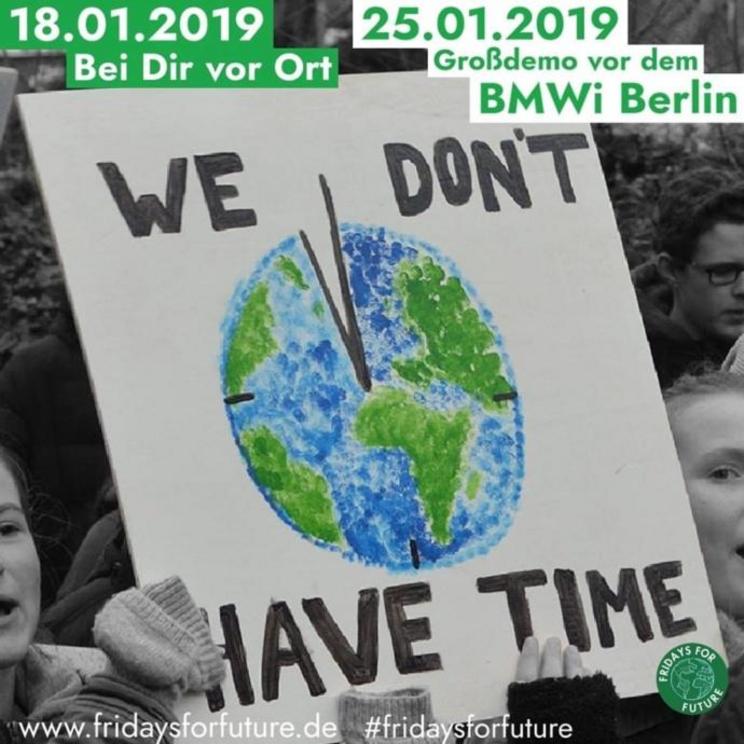
When one contemplates the non-profit industrial complex, it must be considered the most powerful army in the world. Employing billions of staff, all inter-connected, today’s campaigns, financed by our ruling oligarchs can become viral in a matter of hours just by the interlocking directorate working together in unity toward a common goal to instil uniform thoughts and opinions, which gradually create a desired ideology. This is the art of social engineering. Conformity and emotive content as tools of manipulation has been and always will be the most powerful weapons in the Mad Men’s toolbox. If 300, 000 people have already voted with “climate hearts” on a “trending” topic in under 48 hours – it must be a great idea.
“Nobody wants to be bottom of the class.” Ingmar Retzhog, We Don’t Have Time, December 22, 2017, Nordic Business Insider
To be clear, the West is in no position to “teach” (nudge/engineer) the “correct” value system regarding sustainability to the world, when the biggest polluters on the planet are manufactured into “climate leaders” and “climate heroes”. This is reality turned on its head. A reality we are conditioned to accept. Institutions such as the United Nations in tandem with the media, spoon-feed this insanity (that defies all logic) to the global populace, in servitude to the ruling classes.
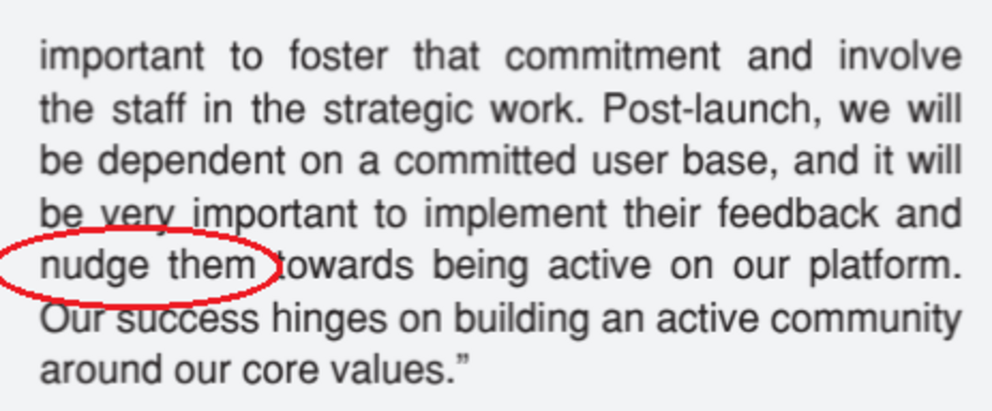
“Nudging”: Acquisition International Magazine Issue 10, 2018
Finally, this behavioral science platform lends itself to the continued devolvement of critical thinking. With virtually everything and everyone to rate all day long – who has time to look in depth at any given policy or product that after all, sounds, looks and feels simply amazing due to sophisticated marketing coupled with behavioural change tactics? It is vital to keep in mind that social engineering – and massive profit – are the key merits and purpose of this application.
End Notes:
[1] TV 2 Danmark Danish public service, SVT Swedish public service, TV 4 News, Metro TV, Dagens Nyheter, Aftonbladet (August 20, 2018), Sydsvenskan, Stockholm Direkt, Expressen (August 20, 2018) , ETC, WWF, Effekt Magazin, GöteborgsPosten,Helsingborgs Dagblad, Folkbladet, Uppsala Nya tidning, Vimmerby Tidning, Piteå Tidningen, Borås Tidning, Duggan, VT, NT, Corren, OMNI, WeDontHaveTime CEO viral FaceBook post that mention it first. [Source]
[2] Click-based advertising based on highly rated companies that want to drive traffic to their websites; Targeted web advertising for companies that want to reach out to environmentally aware users in different segments; Business subscriptions where companies and organizations have the opportunity to interact with the members and get the right to use the We Don’t Have Times brand and the company’s rating in their marketing [Source]
[3] “Laika Consulting was one of the first companies in Sweden to work with crowdfunding when we established the brand in 2004. I look forward to follow the company’s growth closely. A combination of Laika’s expertise in listed companies, together with FundedByMe with its international and digital presence, can create new opportunities for growth.”says Laika’s CEO, Ingmar Rentzhog.” [Source]
